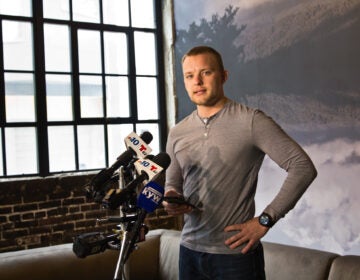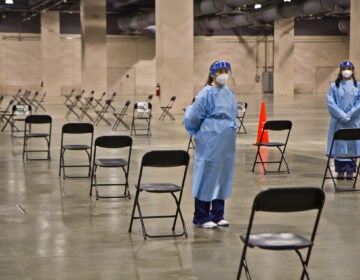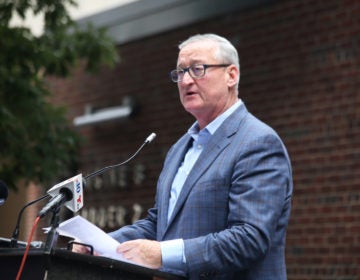‘I don’t have all the answers’: Health commissioner ducks questions at Philly Fighting COVID hearings
Kenney administration officials have been declining to answer questions, citing the ongoing inspector general investigation. It’s not a valid excuse, the IG’s office said.
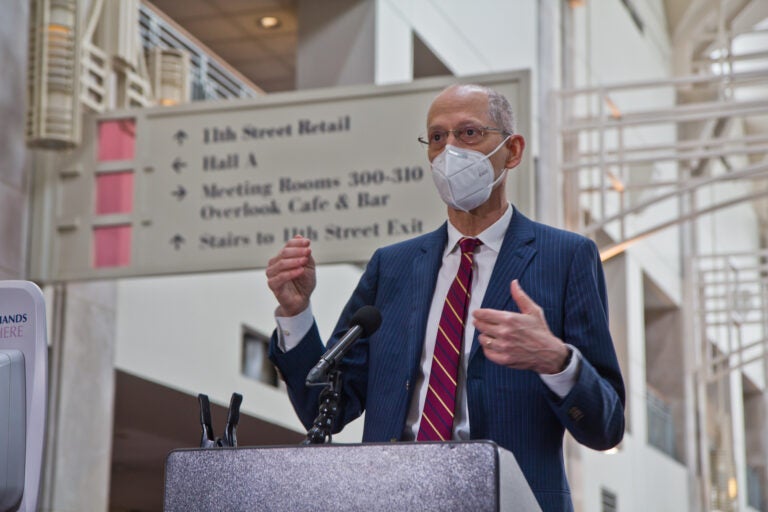
Philadelphia Health Commissioner Dr. Thomas Farley explains how patients who received their first dose of COVID-19 vaccine through Philly Fighting COVID will receive their second through the city health department on Feb. 3, 2021. (Kimberly Paynter/WHYY)
Ask us about COVID-19: What questions do you have about the current surge?
City Council kicked off its probe into the Philly Fighting COVID scandal on Friday with testimonies from the city’s top health official and leaders of Mayor Jim Kenney’s administration.
But answers to pressing questions were few and far between.
Over the course of three hours, lawmakers grilled Health Commissioner Dr. Tom Farley on the Health Department’s relationship with PFC, a 9-month-old startup that became a city vaccine distributor despite lack of health care or immunization experience.
“We were duped,” said Councilmember Cindy Bass, who organized the hearings. She called the fiasco a “complete embarrassment” for the city, one that obliterated trust in the vaccination process.
Minutes into the hours-long hearing, Commissioner Farley said his ability to answer questions would be limited to his first-hand knowledge and memory. He claimed to be barred from asking his own staff for documents and info regarding PFC, due to the ongoing investigation by the Office of the Inspector General.
Earlier this week, officials used the investigation — ordered by Mayor Jim Kenney last week — to decline to answer questions from both reporters and lawmakers. Inspector General Alexander DeSantis later said his office had no such policy to block them from generally discussing the matter.
To Council’s chagrin, Farley said he didn’t know or remember much about how PFC came into the health department’s sightlines, let alone how the startup came to acquire 6% of the city’s vaccine allotment.
It was all handled by members of his staff, Farley said, whom he can’t question.
The once-promising partnership between the Health Department and PFC dramatically imploded at the end of January. The city cut ties over concerns about trustworthiness and data privacy, as other revelations about the organization and its CEO Andrei Doroshin erupted into public light.
A series of investigative articles from WHYY and Billy Penn raised questions about the city’s relationship with the untested group, shedding light on issues that went ignored by officials. The former deputy health commissioner resigned after the Inquirer reported she gave Philly Fighting COVID and another vaccine provider inside information about a city contract. And Doroshin admitted pocketing vaccines from the PFC clinic, an act he first denied.
Farley: ‘I was not the one doing the vetting’
When did the Health Department first meet Philly Fighting COVID? Months ago — Farley couldn’t remember exactly.
How did Doroshin, a 22-year-old Drexel graduate student with no healthcare experience, get appointed to the city’s vaccine advisory committee? Farley didn’t know.
Did anyone in the department vet the CEO or its organization? Who recommended the city put their name next to the organization? How did Philly Fighting COVID receive 6,900 doses of the city’s vaccine allotment when the Black Doctors COVID-19 Consortium, an organization led by a board-qualified surgeon, receive only 2,500 doses?
Again, the leader of the health department didn’t know.
“I was informed that a decision was made,” Farley said. “I was not the one doing the conversations or that vetting.”
The city’s top doctor, whom several elected officials called on to resign over the scandal last week, did acknowledge it was a “mistake” to get involved with the group. He asked city residents for time to restore trust in the city’s distribution plan.
He also offered a direct apology to Dr. Ala Stanford, the head of the Black Doctors Consortium, who said she felt slighted by preferential treatment for the less-qualified PFC.
Farley divulged that Stanford called him in advance of a planned Martin Luther King Day vaccination event where the city had suggested her consortium partner with the startup. Stanford recounted how PFC had offered to train her group on “specific handling requirements” they said they’d learned from the Health Department. Stanford was insulted, Farley said, in part because her group had not even received a vaccine allotment at the time.
Stanford’s complaints to the Health Commissioner resulted in her organization receiving vaccines doses to distribute, he said. The Black Doctors COVID-19 Consortium began running pop-up vaccination clinics in mid-January.
Councilmembers quickly grew tired of Farley’s inability to provide details, and the roadblock presented by the Inspector General investigation.
Why isn’t somebody from the health department here who can answer questions, wondered Councilmember Isaiah Thomas.
“I want to know as much as you do,” Farley said, “but I don’t have the answers to all your questions.”
30 days or less till Inspector General report, officials say
Jim Engler, Kenney’s chief of staff, said the Inspector General’s report regarding the Philly Fighting COVID debacle will be concluded within 30 days.
One new detail Farley did offer: Doroshin first proposed a stadium-sized vaccination site to the Health Department last year. Farley said the plan was initially rejected as “an overreach.” When the CEO came back later with a plan for the Convention Center, he was given the green light.
Much of the testimony swirled around how PFC could receive vaccines without a contract or something in writing.
Farley explained that the official agreement is between providers and the CDC, but the Health Department acts as the federal agency’s representative on the ground, communicating with providers and approving. Philly Fighting COVID met all of the federal criteria, he said.
Farley said the CDC transaction is not equivalent to a legal contract; it’s a provider agreement. The city does not provide any money — only vaccines.
The issue of whether Farley should resign also came up. Farley said he felt he still had skills to help the city’s fight against the pandemic, and that he would defer to Mayor Jim Kenney. The mayor has stood by Farley, whom he appointed health commissioner in 2017.
Said Farley: “You can lose trust in a hurry, but it takes time to regain it.”

Get daily updates from WHYY News!
WHYY is your source for fact-based, in-depth journalism and information. As a nonprofit organization, we rely on financial support from readers like you. Please give today.



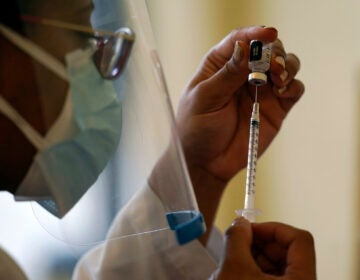
![CoronavirusPandemic_1024x512[1]](https://whyy.org/wp-content/uploads/2020/03/CoronavirusPandemic_1024x5121-300x150.jpg)

